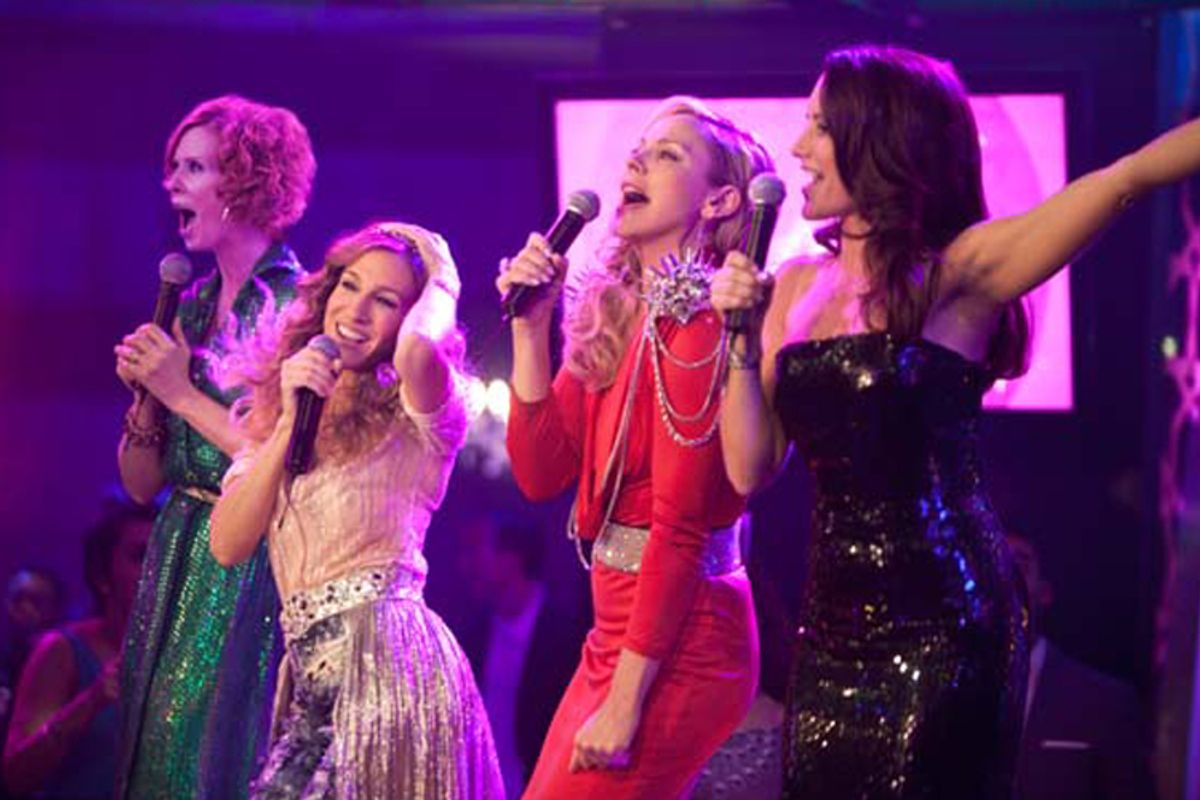The new trailer for "Sex and the City 2" premiered this week, showing the four ladies more flamboyant and improbable than ever: a gay wedding featuring Liza Minnelli, an "Arabian Nights"-inspired trip to Abu Dhabi, topped off by a chance meeting between Carrie and her ex-boyfriend Aidan. But it's Samantha's closing line that I find to be the biggest fairy tale of them all: "We made a deal ages ago -- men, babies, it doesn't matter, we're soul mates."
Over the last decade, the show has received countless criticism, but it's mostly focused on the girls' expensive habits, and how a writer could never afford Carrie's apartment, let alone her shoes. As a New York writer myself, I was never bothered by these things. Nor did I care about the impossibly steady stream of men. It was fun! Who wants to watch women ordering Thai delivery and wearing slip-on Vans? What did bother me was the artifice that has rarely been spoken about -- the friendships.
Girlfriends have always been a part of TV -- Ethel and Lucy, Rhoda and Mary Tyler Moore, Monica and Rachel -- but it took "Sex and the City" to elevate those friendships to the level of salvation, replacing the idealized romance with the idealized friendships, connections that are seemingly impenetrable to real-life factors like work, family, time, money, partners or the lack thereof.
Carrie, Miranda, Charlotte and Samantha's enduring bond at first seemed freeing, an incubator for third-wave feminism where men were accessories and glamour and girlishness were free to roam. This formula caught on like wildfire, showing up in shows like "Lipstick Jungle," "The Women" and "Eastwick," all of which showcased the now-ritualized clink of cocktail glasses. It bled down into the younger set with "The Sisterhood of the Traveling Pants." Even Blair and Serena on "Gossip Girl," despite their soap-opera dramatics, are always there for each other. Women's and celebrity magazines got into the BFF narrative, with the emergence of "It" friendships like Oprah and Gayle, Jen and Courtney, and Penelope and Salma, and advertisers use those laughing cliques to sell everything from birth control to scented candles. For me, these unimpeachable, everlasting friendships have become just another implausible expectation, and one that I can't live up to.
My female friendships, many of which are long-standing and intimate, don't come close to the soul union shared by these ladies. The truth is, I have some good old friends, and some good new ones too -- silver and gold, as the old Girl Scout song says. But they certainly don't fit together like a dinette set: They are separated by interests, personalities, geography, bouts of depression, and unadaptable partners. I have never figured out a way to turn them all into an inspired motley crew à la "Sex and the City," and nor, from what they tell me, have any of my friends. If anything, this has only gotten harder as I live longer, have more experiences, and meet more people; the chance that any one person or small gang can cover every edge of me seems to be shrinking.
The truth is, despite the warnings of much of the chick lit and chick flicks from the last decade, finding love and marriage turned out to be not so hard. Instead, it was the perfect girlfriend, or girlfriends, that has been so elusive. Nonetheless, year after year, images of the "girls" or the "ladies" keep coming at me, on sitcoms, commercials, in movies and books. I could compare this commodification of lady cliques to the commodification of our bodies for profit, but with that we at least have a public dialogue to inform and protect us. I have nothing to protect me from feeling bad that I don't have a brunch posse, or an obvious crew of bridesmaids.
There has been such an outpouring of honesty over the last decade about how hard our most important relationships can be. I don't feel too bad about the complicated ways in which I am a daughter, a wife, or a sister, and will even likely be open to my own ambiguities as a mother. But the dialogue about friendships, it hardly seems to exist.

Shares